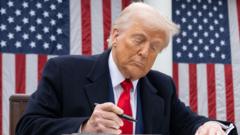In a surprising twist, President Trump's administration has decided to pause the implementation of higher tariffs, seeking to foster negotiations rather than escalating trade tensions.
Trump's Tariff Schedule on Hold as Markets React Positively

Trump's Tariff Schedule on Hold as Markets React Positively
Trump's unexpected tariff pause reflects shifting global trade dynamics and market reactions.
For days leading up to the announcement, President Donald Trump and his White House stressed their commitment to imposing expansive "reciprocal" tariffs on several nations, dismissing speculation about a possible pause. However, amid mounting investor anxiety and plunging bond markets, that pause has now been put into effect, albeit with critical exceptions, altering the trajectory of the global economic landscape. Following this announcement, the promise of a revitalized American manufacturing sector must now be deferred, as the administration pivots toward negotiation rather than confrontation.
Treasury Secretary Scott Bessent indicated that over 75 countries had reached out for discussions, citing a plan for engagement that had been in the works. This narrative from the White House likely aims to counter the perception of retreat in light of economic pressure. Nevertheless, skepticism remains high. Critics question whether this move is a mere retreat under pressure or a cunning part of Trump's famed negotiation playbook.
Trade advisor Peter Navarro celebrated the announcement, asserting that events were unfolding as intended. Press Secretary Karoline Leavitt defended the decision, claiming that the world is recognizing and reaching out to the U.S. after the announcement. However, questions regarding the specifics of the tariff suspensions – including impacts on the EU, Mexico, and Canada – lingered with little clarity initially provided.
Amidst this backdrop, Trump acknowledged public anxiety over the economic situation, suggesting an awareness of the implications his tariffs have had. He described the economic disruptions as symptomatic of deeper issues festering within the American economy. Meanwhile, Senate Minority Leader Chuck Schumer lambasted the administration's chaotic governance, interpreting Trump's shift as a retreat.
The reality remains: the U.S. is attempting to mend relations with nations previously hit by tariff reprisals while sustaining a confrontational trade stance towards China, where tariffs reportedly have risen by as much as 125%. The long-term impact of this week’s events remains uncertain, as the U.S. negotiates its position on the world stage, contending with emerging economic challenges and setting the stage for potential turmoil when the tariff pause concludes in 90 days.




















